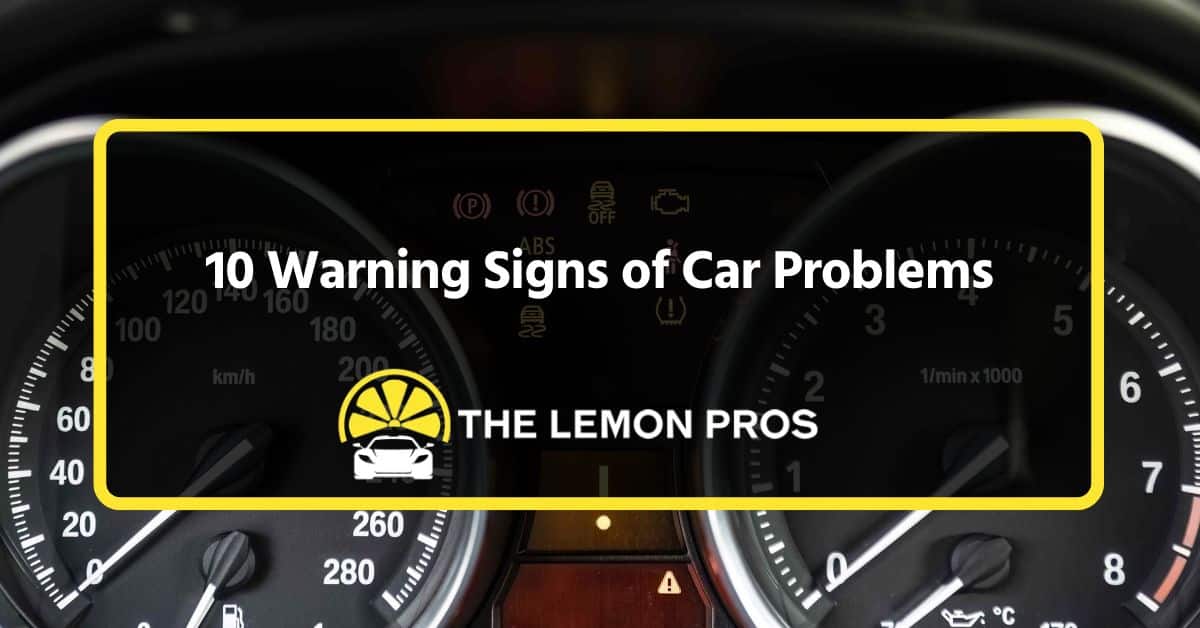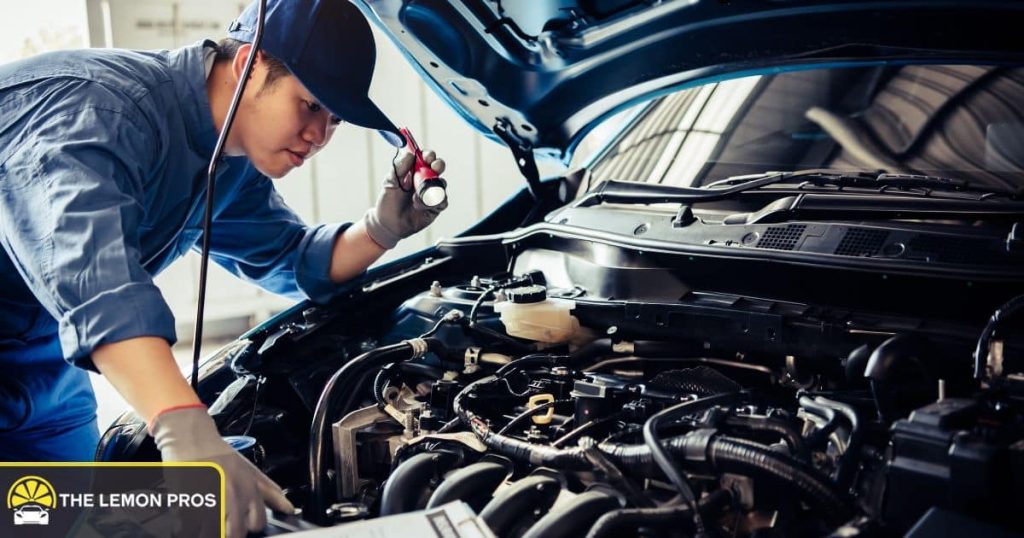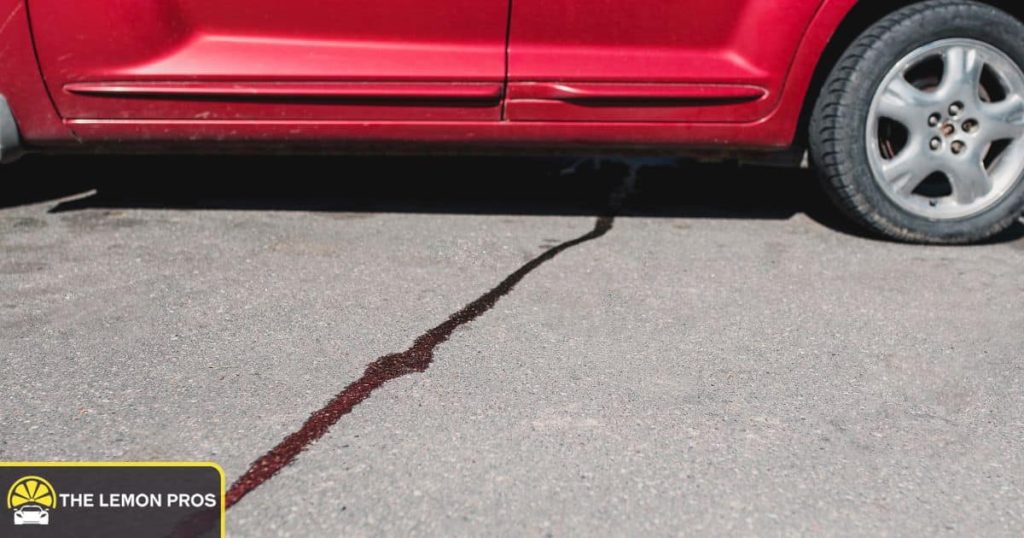
10 Warning Signs of Car Problems
Among the top signs of car problems, whenever the dashboard warning lights come on, you hear a strange sound, or the car does not seem to perform as well as it should, you need to pay attention. Of course, if the problems remain consistent despite your attempts to have them repaired, you may be facing a lemon vehicle.
The Lemon Pros are experts in defective vehicles and getting compensation. With a practice area centered on lemon cars, our team of professionals has secured millions in settlements for our clients in California. Contact us today for your free consultation to see what you are entitled to.
In this comprehensive guide, we cover the warning signs you need to know about. From the Check Engine Light to a coolant leak, or strange sounds, we show you why promptly addressing warning signs is in your best interest. In addition, we discuss when it’s time to take action and start a Lemon Law claim.
Table Of Contents
- Common Signs of Car Problems Every Driver Should Know
- What Your Car’s Warning Lights Really Mean
- Preventive Maintenance Tips to Avoid Car Problems
- 10 Signs of Car Problems That Need Immediate Attention
- Warning Signs You Might Be Driving a Lemon Car
- When to Seek Legal Help for Persistent Car Problems
- Is It Time to Talk to a Lemon Law Lawyer?
- FAQ
Common Signs of Car Problems Every Driver Should Know

Recognizing early indicators of car problems helps to prevent costly repairs. Common warning signs include unusual noises, such as engine knocking or squealing, dashboard alerts (check engine light), visible fluid leaks, and vibrations while driving or braking.
Smoke or burning smells are also red flags that should never be ignored. Catching these issues early can protect your vehicle and reduce the risk of serious mechanical failure.
| Sign/Symptom | Possible Cause | Urgency Level | Recommended Action |
|---|---|---|---|
| Unusual engine noises | Engine knocking, worn belts, or exhaust issues | High | Stop driving if severe; schedule immediate inspection |
| Check engine light | Engine or emissions system issues | Medium-High | Diagnose promptly; some issues may allow limited driving |
| Oil pressure warning | Low oil level, pump failure | Critical | Stop driving immediately; add oil if safe, then service |
| Battery warning light | Failing battery or alternator | Medium | Drive minimally; have charging system checked soon |
| ABS or brake light | Brake system or ABS malfunction | High | Avoid driving aggressively; service brake system immediately |
| Fluid leaks | Oil, coolant, transmission, or brake fluid | High | Inspect and repair before further driving |
| Smoke or burning smell | Overheating, electrical, or fluid leaks | Critical | Pull over safely; have car towed and inspected |
| Vibrations or shaking | Tires, suspension, or engine problems | Medium | Check tires and suspension; schedule service if persistent |
| Tire pressure warning | Underinflated tires | Medium | Check and inflate tires; inspect for punctures |
Unusual Noises and Their Meanings
It is important to listen to the sounds coming from your vehicle, as these can tell you early on if there is a problem. Here are a few common sounds you may encounter:
- Squealing or squeaking: Sign of worn brake pads, defective belts, or worn suspension parts
- Engine knocking or tapping: Strange noises can indicate engine damage and need to be looked at immediately
- Grinding: Warped brake rotors or transmission problems
- Clunking or rattling: Component may be loose, or there could be a suspension issue
- Whining: Noises while driving can indicate a transmission or power steering failure
When dealing with strange noises, it is important to pinpoint where they are coming from. Once you narrow down the system involved, it will be much easier to determine what needs to be fixed.
What Your Car’s Warning Lights Really Mean
Dashboard warning lights are clear signs of car problems and should never be ignored. Each light points to a specific issue and helps you decide whether to act immediately or schedule service soon. Here are some of the most common lights found on modern vehicles.
Check engine light - Indicates a wide range of engine or emissions issues, from minor sensor problems to serious mechanical faults. It should be checked as soon as possible, even if the car seems to drive normally.
ABS light - Signals a problem with the anti-lock braking system. Brakes may still work, but reduced safety means repairs should not be delayed.
Oil pressure light - Warns that the engine may not be getting enough oil. This requires immediate action, as driving can cause severe engine damage.
Battery warning light - Points to charging system issues, such as a failing battery or alternator. You may be able to drive briefly, but the vehicle could lose power unexpectedly.
Brake warning light - Indicates low brake fluid, worn brake components, or a parking brake issue. Because it affects stopping power, this should be addressed immediately.
Engine temperature (coolant) light - Signals the engine is overheating, often due to low coolant or cooling system failure. Continued driving can cause severe engine damage.
Tire pressure monitoring system (TPMS) light - Warns that one or more tires are underinflated. While not always urgent, low tire pressure can affect safety, fuel economy, and tire wear.
Traction control or stability control light - Indicates reduced traction assistance, often caused by sensor issues or slippery conditions. Safe driving may be impacted, especially in poor weather.
Check Engine Light vs. Other Warning Lights
Not all dashboard warning lights carry the same urgency. The check engine light often covers a wide range of issues, from minor sensor glitches to serious engine or emissions problems, so the required action can vary. If the check engine light is blinking, this indicates an immediate fault, and the car should be turned off until it can be looked at.
Other warning lights, such as those for oil pressure, brakes, or the battery, usually indicate system-specific problems that can pose immediate safety or mechanical risks if ignored. Understanding this difference helps drivers know which alerts require prompt attention and which can be scheduled for service, keeping both the vehicle and its occupants safe.
Preventive Maintenance Tips to Avoid Car Problems

By carefully maintaining a vehicle, some problems can be prevented. Most dealerships recommend the following maintenance.
- Schedule regular oil changes. Clean oil keeps engine components lubricated and reduces wear that can lead to serious mechanical issues.
- Rotate and inspect tires. Regular tire rotations promote even wear and help prevent vibrations, pulling, and premature tire failure.
- Check brakes routinely. Early brake inspections can catch worn pads or low brake fluid before braking performance is affected.
- Top off essential fluids. Engine coolant, transmission fluid, brake fluid, and power steering fluid all play a role in preventing overheating and system damage.
- Pay attention to warning signs. Addressing early noises, warning lights, or performance changes can stop minor issues from becoming major repairs.
- Monitor your vehicle between services. Watch for leaks, track dashboard warning lights, listen for unusual sounds, and note any changes in handling or fuel efficiency.
We recommend taking your car to the dealership for all maintenance during the warranty period. Prior to making the appointment, be sure to educate yourself on how long it should take to get car service.
How Often Should You Service Your Car?
Regular car service is essential to prevent minor car problems from turning into major repairs. Most vehicles follow a basic schedule, though it can vary by make, model, and driving habits.
Engine oil and filter changes are typically recommended every 5,000 to 7,500 miles, while tire rotations and brake inspections are usually needed every 6,000 to 10,000 miles. Other components, like the transmission, coolant system, and spark plugs, often have longer intervals, ranging from 30,000 to 100,000 miles, so it’s important to consult your owner’s manual.
Even with a routine schedule, certain warning signs can indicate the need for unscheduled maintenance. Unusual noises, vibrations, warning lights, fluid leaks, or changes in handling are all cues that your car may need immediate attention. Responding promptly helps prevent minor issues from becoming costly repairs.
10 Signs of Car Problems That Need Immediate Attention

If you have recently bought a car and it is already acting up, you are not alone. New car issues are more common than you may think. Let us dive right into the top 10 warning signs you should watch for.
1. Common Dashboard Warning Lights (Check Engine Light)
Modern cars are equipped with a self-run diagnostic system for many of the major components. When there’s a fault, a warning light will illuminate on the dashboard to tell you something is wrong. Here are some of the most common warning lights and their meanings:
- Check Engine Light: Engine or emissions issue (Serious fault if the light is blinking)
- Oil Pressure Light: Low oil level or pressure
- Battery Light: Charging system malfunction
- Brake Warning Light: Low brake fluid or brake system malfunction
- ABS Light: Anti-lock braking system fault
- Coolant Temperature Warning: Engine overheating
- Tire Pressure Light (TPMS): Low tire pressure or faulty sensor
- Airbag Warning Light: Malfunction with the airbag system
- Traction Control Light: Traction or stability issue
- Service Vehicle Soon: General maintenance required
- Transmission Temperature Light: Transmission issues related to overheating or low transmission fluid levels
Your owner’s manual should show you the varying lights your car offers, or you can find the information online specific to your vehicle. Once a warning light comes on, you need to have the codes scanned with a special computer to find out what the fault is.
Repairs should be made immediately to prevent further damage. For example, by continuing to run an engine with faulty spark plugs, you allow damage to the catalytic converter, which can be extremely expensive to replace.
2. Strange Noises
It is important to listen to the sounds coming from your vehicle, as these can tell you early on if there is a problem. Here are a few common sounds you may encounter:
- Squealing or squeaking: Sign of worn brake pads, defective belts, or worn suspension parts
- Engine knocking or tapping: Strange noises can indicate engine damage and need to be looked at immediately
- Grinding: Warped brake rotors or transmission problems
- Clunking or rattling: Component may be loose, or there could be a suspension issue
- Whining: Noises while driving can indicate a transmission or power steering failure
When dealing with strange noises, it is important to pinpoint where they are coming from. Once you narrow down the system involved, it will be much easier to determine what needs to be fixed.
3. Unusual Vibrations or Shaking
Vibrations while driving could indicate simple tire issues or larger suspension problems. There could also be brake issues involved, especially if the shaking is noticed most when pushing on the brake pedal.
To prevent costly repairs and ensure everyone’s safety, you want to have the vehicle inspected immediately. Ignoring these signs can cause faster wear on other parts and make driving more dangerous over time.
4. Fluid Leaks
Automotive fluid leaks are not only bad for the environment but also put stress on the system that has low fluid levels. The easiest way to determine what’s leaking is to look at the color of the fluid.
- Amber or light brown: Engine oil is amber when it’s fresh, but turns brown or black when it ages.
- Red or pink: Transmission fluid is bright red when fresh, but turns dark brown with a burnt smell when it’s older or contaminated.
- Pink, orange or green: Coolant or antifreeze color varies by type, but green tends to be the most common, while most will have a sweet smell.
- Yellow or clear: Brake fluid is light yellow or clear when new, but it can darken over time.
- Slightly blue or clear: Windshield washer fluid is often light blue and smells like cleaner.
- Red, amber or light brown: Power steering fluid looks similar to transmission fluid.
- Dark brown or black (thick): Gear oil has a strong sulfur smell; it’s found in differentials and manual transmissions.
Fluid leaks can lead to serious damage if left unchecked. Low fluid levels can cause overheating, loss of lubrication, or even complete system failure in parts like the engine, brakes, or transmission.
5. Poor Performance, Loss of Power, or Engine Stalling
When the vehicle’s performance is lacking, it is a sure sign that something is wrong. You may notice difficulty accelerating when you push down on the gas pedal, engine stalling, or reduced fuel efficiency.
These problems are often related to the fuel system, engine problems, or the ignition system, such as the spark plugs or coils. There may also be a clogged filter that needs to be replaced.
By continuing to run the engine like this, you not only lose money because of the drop in fuel economy, but you also face larger repairs later that are going to drain your bank account.
6. Unusual Smells
Just as you want to pay attention to bad sounds, you should also be on high alert for unfamiliar odors. Here are some common smells that occur during car problems:
- Burning smell: Worn brakes and oil leaks can cause burning odors.
- Sweet smell: A coolant leak creates a sweet smell.
- Rotten egg smell: When the catalytic converter goes bad, it often creates a noticeable sulfur smell.
- Gasoline smell: Smelling fuel in or out of the car can point to a dangerous leak.
- Moldy smell: Typically a sign of mildew in the air conditioning system or cabin air filter.
If you notice a strange smell, do not ignore it. Odors can signal serious problems under the hood. Pull over safely, check for visible leaks or smoke, and have the vehicle inspected by a mechanic as soon as possible.
7. Steering Problems
If the car suddenly has difficulty steering, you notice a wheel pulling, or if there is excessive looseness, you should also pay attention. The wheel alignment may be off, or there could be low tire pressure, both of which affect the vehicle's safety. There is also the chance that there is a power steering fluid leak occurring.
First, you should make sure you have properly inflated tires. If all looks well with the tires, we recommend having a technician inspect the car to prevent potential safety hazards.
8. Brake System Issues
If you notice trouble stopping when you apply the brake pedal, there could be issues with the system. You may also notice squeaky brakes or a spongy pedal. Brake fluid leaks are a common reason for trouble stopping, along with worn brake pads or rotors.
Because of the critical safety implications of braking problems, it is vital to have a professional inspection performed. Expert brake services will include a complete evaluation of the system. The technician will look at the pads, rotors, brake lines, and master cylinder to find any problems.
9. Transmission Troubles
Transmission fluid leaks, delayed shifting, slipping gears, and unusual sounds should all be looked at immediately. Car owners may be able to have a low-cost fix if the problem is caught early on, and can prevent a transmission replacement, which is expensive and time-consuming.
To keep the car running smoothly and to prevent transmission problems, regular maintenance is critical. Make sure you follow the manufacturer’s recommendations for transmission service, including flushes.
10. Electrical System Issues
If you see a dashboard light, such as the stability control light, you may only be looking at an electrical problem. With today’s sophisticated cars, the electrical system is responsible for keeping the engine running smoothly. You may notice dimming lights, malfunctioning accessories, or battery problems, apart from the engine issues.
In some cases, a code scanner will be needed to read trouble codes. If the engine cranks slowly or won’t start at all, there may be an issue with the charging system, such as the battery or alternator. Otherwise, it may be something related to the ignition system, such as a faulty starter motor, a bad ignition key, or other electrical components.
You can try to replace the battery to see if that fixes the issue, but most of these problems should be dealt with by a professional mechanic.
Warning Signs You Might Be Driving a Lemon Car

There are many types of problems covered by the Lemon Law in CA, so it is important to know what may be included. Here are some criteria to keep in mind:
- A significant defect affects the car’s safety, value or drivability.
- The car is covered by the manufacturer’s warranty.
- The defect begins within 18,000 miles or 18 months of taking ownership of the vehicle.
- The car has been in for multiple repair attempts without a remedy.
- The car has been in the shop for more than 30 days for a single problem.
While most Lemon Law claims are for new cars, there are some provisions for used cars as well. To file a used car Lemon Law claim in CA, the vehicle would need to be covered under a warranty.
What Is a Lemon Car in California?
This is one of the most-asked questions we hear. What is a lemon car, and can you expect compensation? To qualify for California Lemon Law coverage, your vehicle must:
- Be purchased or leased new or certified pre-owned in California.
- Be covered by the manufacturer’s original warranty.
- Have a defect that continues after multiple repair attempts (four for the majority of cases, but only two with a serious safety-related concern).
- OR be out of service for 30+ total days for repairs.
If you live outside of California, it is essential to research local laws, as some states don’t have the same level of protection for consumers. Although, you may be eligible for protections through the federal law, known as the Magnuson-Moss Consumer Warranty Act. Some problems that may lead to a Lemon Law claim include, but are not limited to:
- Engine failure
- Repeated stalling
- Malfunctioning oxygen sensor
- Failing transmission
- Brake system defects
- Steering malfunctions
- Defective headlights or fog lights
- Overheating engine
- Exhaust system malfunctions
- Cooling system troubles
It’s vital that you know what to do if you have a lemon because time is of the essence. For this reason, we believe that you need a lawyer for Lemon Law claims. An attorney can file for arbitration through the Department of Consumer Affairs (DCA) and negotiate on your behalf.
Can I Get a Refund for a Defective Vehicle in California?
Yes – if your vehicle qualifies under California’s Lemon Law provisions, you may be entitled to a full or partial refund. The average Lemon Law settlement in California is between $40,000 and $50,000, but these amounts depend on your type of car and the defect.
A Lemon Law buyback may include the full purchase amount, your down payment, already made monthly payments, the loan payoff, registration fees, sales tax, and towing or rental car costs, if applicable. You may also be entitled to a replacement vehicle that compares to what you are currently driving. In some cases, usually for minor faults, you may prefer the cash-and-keep settlement instead.
In California, Lemon Law cases are on the rise. New analysis shows nearly 22,000 cases filed in 2024, compared with only about 15,000 in 2023. With this information, it is clear that the need for lemon law attorneys is higher than ever.
When to Seek Legal Help for Persistent Car Problems
Some car problems go beyond routine repairs. When issues keep returning, or repairs fail, it may be time to explore legal options.
If your vehicle has the same defect repaired multiple times, spends excessive time in the shop, or continues to have serious safety or drivability issues, it may qualify for lemon law protection. These laws are designed to protect consumers when dealerships and manufacturers cannot fix substantial defects. In California, the dealership cannot hold your car for more than thirty days before it is considered a lemon.
The typical process involves giving the dealership a reasonable number of repair attempts and allowing them to document each visit. If the problem persists, the next step is often escalating the issue to the manufacturer.
Thorough documentation is critical. Keep repair orders, invoices, dates, and descriptions of every issue. Consulting a lemon law attorney can help determine whether your case qualifies and guide you through the process of seeking a refund, replacement, or compensation.
If lawyer fees are holding you back from getting a lawyer, we understand the difficulty. Recent reports show the average attorney fee in California nearing $400 per hour. Thankfully, we charge on a contingency basis, so you will not need to pay anything upfront.
Is It Time to Talk to a Lemon Law Lawyer?
Hopefully, you have done your part to keep up with regular car maintenance, and you should be able to expect a good-running vehicle. When that does not happen, it is time to take action. Whether you are dealing with a flashing Check Engine Light, a faulty oxygen sensor, or other engine-related problems that cannot be repaired, it may be time to speak with an attorney.
The Lemon Pros are prepared to fight for your rights. As a top Lemon Law attorney in California, you can trust us to negotiate on your behalf as if it were our own case. We offer a free case evaluation and are ready to meet with you to estimate a settlement amount.
FAQ
Cars can develop issues at any time, and it is normal to have questions about what certain symptoms mean and how to handle them. This FAQ section answers common concerns about car problems, warning lights, maintenance, and when to seek professional help.
What Car Problems Should I Never Ignore?
Certain car problems should never be ignored, even if they seem minor at first. A clogged radiator can cause the engine to overheat, leading to severe damage. A loose gas cap may be a minor issue, but it can trigger the check engine light and affect fuel efficiency or emissions. Issues with the vehicle’s wiring can disrupt essential systems like lights, sensors, or the engine, creating safety hazards. Additionally, if the check engine light starts blinking, you should pull the car over immediately to prevent further damage.
How Can I Tell if My Car Transmission Is Failing?
Common warning signs include delayed or rough shifting, slipping gears, unusual noises like whining or clunking, fluid leaks, and a burning smell from the transmission. If your car hesitates to move, jerks while accelerating, or the transmission warning light appears on the dashboard, these are red flags. Addressing these issues promptly with a professional inspection can prevent total transmission failure and keep your vehicle safe to drive.
How Often Should I Perform Preventive Maintenance to Prevent Car Problems?
Regular preventive maintenance is key to avoiding serious signs of car problems, especially issues with your car’s engine. Basic maintenance like oil changes, fluid checks, tire rotations, and brake inspections should generally follow the intervals in your owner’s manual, often every 5,000 to 7,500 miles for oil changes and 6,000 to 10,000 miles for tire rotations and brake checks.
What Is a Red Flag When Buying a Car?
If the seller does not have the title or it is not in their name, you should be wary. You also want to take a used car to a mechanic for a pre-purchase inspection to see if there are any issues to be aware of. If the seller won’t let you take the car to a mechanic, it is advisable to purchase from someone else.
What Car Problems Are Most Common in Lemon Law Claims?
Lemon problems range from a rising temperature gauge and an overheated car because of a faulty water pump or other engine malfunctions. They could also be issues as simple as electrical glitches to body corrosion. Any significant defect that affects the safety, value, or use is covered if the other requirements are met.
Disclaimer: This content is for informational purposes only and does not constitute legal advice. Laws vary by state, and outcomes depend on the specific facts of each case. Consult a qualified attorney for advice regarding your individual situation.






